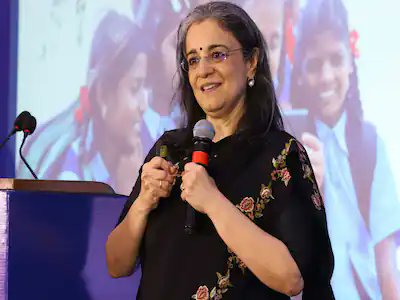New Delhi: The Congress Tuesday questioned the ICICI Bank’s assertion that it had not paid any salary or granted ESOPs to SEBI Chairperson Madhabi Buch after her retirement and asked that if the amount paid to her was her “retiral benefit”, why was it non-uniform both in terms of its frequency and amount.
The opposition party levelled fresh conflict-of-interest allegations against Buch Monday and asked Prime Minister Narendra Modi to come clean as the head of the Appointments Committee of the Cabinet on her appointment.
It alleged that since Buch took office in 2017, she has not only been drawing a salary from the SEBI but has also been holding an office of profit at the ICICI Bank, continuing to receive income from the bank to this very day.
Subsequently, the bank said it has not paid any salary or granted ESOPs to Buch after her retirement on October 31, 2013, as alleged by Congress.
Rebutting the claims, Congress’s media and publicity department head Pawan Khera said the ICICI Bank’s statement attempts to provide a response but, in reality, ends up giving more information and confirming his party’s charges.
The ICICI Bank claims that the amount paid to Buch had accrued to her during her “employment phase” at the bank and is her “retiral benefit”, Khera said and asked why has this so-called “retiral benefit” been non-uniform both in terms of its frequency and amount.
“Even if we were to assume that the Rs 5.03 crore she received from ICICI in 2014-2015 (soon after her superannuation) was part of her retiral benefit and that she got nothing in 2015-2016, why did this so called retiral benefit resume in 2016-2017 and continue until 2021?” he asked at a press conference at the AICC headquarters here.
“The average salary drawn by Ms Madhabi P Buch from 2007 up until 2013-14 (right before her superannuation from ICICI) is Rs 1.3 crore lakh per annum. However, the so-called retiral benefit given by ICICI to Madhabi Buch from 2016-17 to 2020-21 averages to around Rs 2.77 crore per annum. How can a person’s retiral benefit be more than her salary as an employee?” the Congress leader asked.
The bank’s clarification states that “employees, including retired employees, had the choice to exercise their ESOPs anytime up to a period of 10 years from the date of vesting”, Khera said, adding that however, the only ESOP policy ICICI has publicly disclosed on its website is the one uploaded on the US Securities Exchange Commission (SEC) website, and it clearly states that former employees can exercise their ESOPs within a maximum of three months following their voluntary termination.
Where is this “revised policy” under which Buch was able to exercise ESOPs eight years after the voluntary termination of her services, the Congress leader asked.
“Why hasn’t the revised policy been made publicly available by the ICICI? Why was Ms Madhabi Buch allowed to exercise ESOPs at a time when the share price of this company increased substantially, thereby benefitting her? And strangely, this benefit that accrued to her coincided with her tenure at the SEBI. Wasn’t the market price beneficial to her?” he asked.
Were the ESOPs given to Buch sourced from the Employees’ ESOPs Trust and if so, was this not prejudicial to the interests of the other employees of ICICI, Khera asked.
He also asked why did ICICI pay the TDS on ESOPs on behalf of Buch and whether it follows the same protocol for all its past and present employees.
“Why did ICICI not offer this TDS amount as taxable income of Ms Madhabi P Buch? Is this not a clear non-compliance of the Income Tax Act?” Khera asked.
The Congress alleged Monday that Buch, who joined the Securities and Exchange Board of India (SEBI) as a member in 2017 and subsequently, became its chairperson, received Rs 16.8 crore from the ICICI Bank as salary and other compensation.
In a statement, the bank said, “ICICI Bank or its group companies have not paid any salary or granted any ESOPs to Madhabi Puri Buch after her retirement, other than her retiral benefits. It may be noted that she had opted for superannuation with effect from October 31, 2013.”
During her employment with the ICICI Group, she received compensation in the form of salary, retiral benefits, bonus and ESOPs, in line with applicable policies, it added.
“Under the bank’s ESOP rules, the ESOPs vest over the next few years from the date of allotment. As per rules existing at the time of her ESOP grant, employees, including retired employees, had the choice to exercise their ESOPs anytime up to a period of 10 years from the date of vesting,” it said.
PTI







































